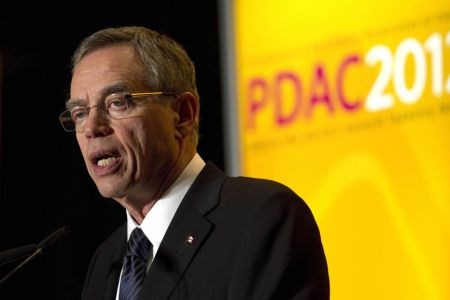Federal Natural Resources Minister Joe Oliver said Ontario's Ring of Fire is “tremendously important” to Canada's resource base and has the potential to create huge development opportunities for the region and First Nations.
“What I see is an enormous opportunity to create employment,” said Oliver, through the creation of jobs for Aboriginals in mining, expanded rail and road transportation, power generation, transmission line development and smelter operations.
'There are chances of equity participation and opportunities for community funding. This can be transformative in a very positive way” for remote communities dealing with high unemployment.
The federal budget released in late March outlined the government's plan to overhaul the environmental approvals for major resource projects, but as of mid-April, the legislation had yet to be tabled in Parliament.
Oliver said a federal regulatory process must be put in place that's “efficient, effective, expeditious” and welcoming to foreign investment, but won't compromise the legitimate concerns of First Nations and other stakeholders from voicing their concerns.
In his many speeches across Canada, Oliver has called out environmental groups for highjacking the review process.
“It's still very much an issue. We've made progress in some areas, but we need fundamental and comprehensive improvement in our regulatory system.”
Through better coordination with the provinces, he wants to avoid the “cumbersome” duplication from the two-track federal and provincial environmental review process on large mining projects.
Fixed timelines in projects delivers predictability for companies and investors, and creates jobs earlier, he said.
He provided no specifics as to when policy or a regulatory framework would be revealed since Ottawa must respect provincial ownership of natural resources. But, he added, “we're talking months, not years.”
Critics claim Ottawa wants to fast-track mining projects at the expense of proper consultation with First Nations.
“We're not going to be running roughshod over anybody. We intend to respect our obligations and have a respectful dialogue with First Nations.
“We have to go about this in a way that is responsible socially and environmentally, but we've got to get on with this.”
Oliver, who was scheduled to make a speech in Sudbury in March until left stranded in Toronto by a baggage handlers strike, staged a conference call with the executive board of the Sudbury Area Mining Supply and Service Association (SAMSSA).
He recognized the importance of Sudbury's mining sector and how the technology and innovation developed there makes Canada a world leader.
He took note of comments made by SAMSSA members about Ottawa developing closer relationships with small and medium-sized business, and of the glaring shortage of technical tradespeople.
Oliver said the shortage of skilled workers is a “critical risk” for Canada, with the mining industry forecasting a need of 75,000 to 140,000 new employees in the next decade.
Canada faces a decline in productivity, a loss of investment opportunity, and reduced global standing in mining, if labour requirements can't be meet, he said.
The cost of recruiting and training skilled labour is becoming a thorny issue.
Dick DeStefano, SAMSSA's executive director, said there is often fierce competition for labour between the primary mining industry and the service and supply sector.
“If the guy doesn't stay, you've lost investment,” he said. “The concept of raiding becomes a big issue.”
DeStefano said his executive impressed upon the minister how the application of technology is increasing the industry's productivity and efficiencies.
“We're a hot bed for underground mining and we need government support to continue doing that...but more transparent (environmental review) regulations would help.”




